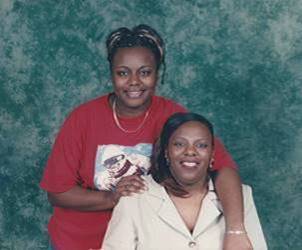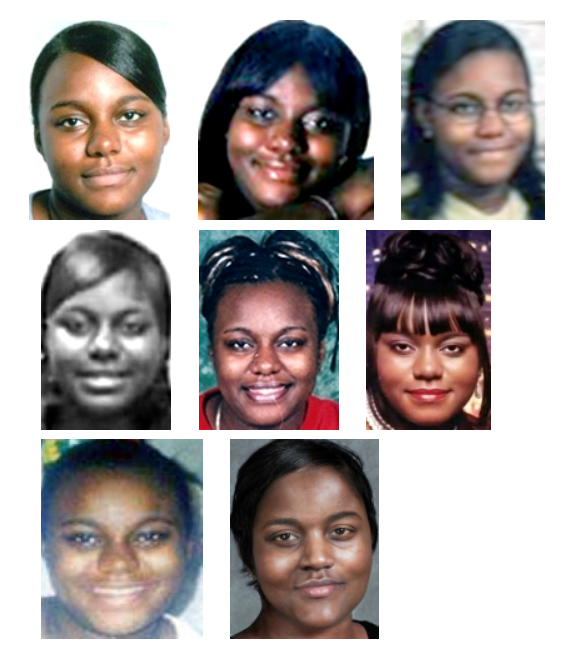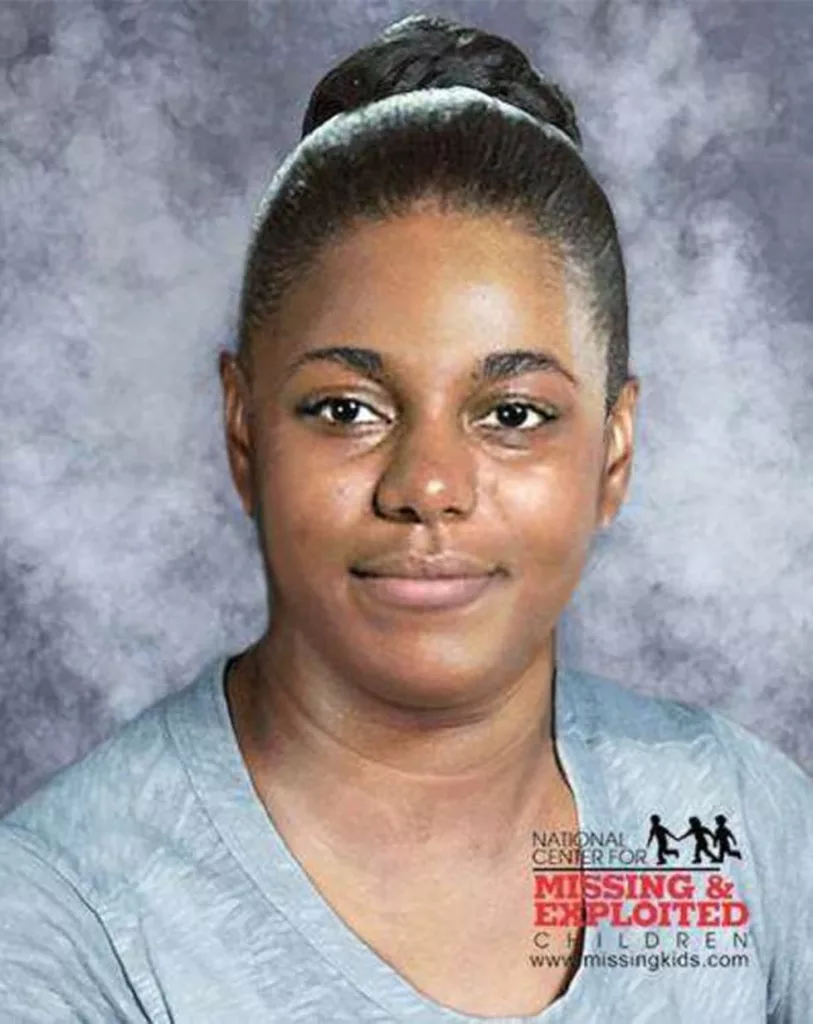Nineteen-year-old LaQuanta Riley left her mother’s house on a cold night in December 2003 and hasn’t been seen since. A mysterious voicemail is one of several strange leads in the case. Almost twenty years later, her family continues to search… What happened to LaQuanta?
Episode Media



Episode Sources
- LaQuanta Nachelle Riley – The Charley Project
- Have you seen this child? – MissingKids.org
- Keeping Hope Alive for Alabama’s Missing Kids
- Doe Network – LaQuanta Nachelle Riley
- LaQuanta Riley – Missing But Not Forgotten – Facebook
- RILEY Relief Foundation – Facebook
- “Buttons put faces on missing adults: City family calls project blessing,” pt. 1
- News conference on Alabama’s missing persons
- Voices Of Our Missing vigil held in Montgomery
- Where is my daughter? Decade-old mystery tortures Montgomery mother
- A Mother’s Quest For Her Daughter Who Has Been Missing For Eleven Years . . .
- Search continues for teen who disappeared in Montgomery 15 years ago; $11,000 reward offered
- 15 Years Later, Mother of Missing Woman Still Searching For Answers
- Family continues search for woman missing since 2003
- LaQuanta Nachelle Riley: Missing Teen’s Mysterious Case Puzzles Police
- LaQuanta Riley – Disappeared
- Reward Increased in LaQuanta Riley Disappearance – Alabama News
- Officials offer $11,000 reward for information about missing woman’s disappearance
- Missing: LaQuanta Nachelle Riley
- LaQuanta Riley – And Then They Were Gone
- Missing in Alabama: Where is LaQuanta Riley?
Episode Transcript
Welcome back to Bite-Sized Crime! This week I am bringing you the story of a family marked by tragedy and a mother who refuses to give up. This episode discusses sensitive topics, so listener discretion is advised.
Pamela Riley was just sixteen years old in 1984 when she gave birth to her first child, a beautiful baby girl she named LaQuanta Nachelle. Pamela herself had not had an easy childhood; her own mother had been murdered in a domestic violence dispute when Pamela was just four years old. Pamela had been raised by her Aunt Katie who loved her like she was her own. So when a teenaged Pamela realized that she needed help raising baby LaQuanta, she immediately reached out to her beloved aunt.
Aunt Katie took LaQuanta in and raised her, just like she had done with Pamela. As LaQuanta grew up, Pamela was an active part of her life. Over the years, they communicated through letters and cards between visits. By the time LaQuanta was in middle school, Pamela had matured greatly, taking on more of a motherly role in her daughter’s life.
By the mid-nineties, Pamela had five more children, and LaQuanta adored her younger siblings. She was especially close to her younger sister Kamesha. Tragically, Kamesha was the victim of a sexual assault perpetrated by a 48-year-old man who infected her with HIV. Kamesha passed away in 1996 at the age of 9. It was another horrific blow to Pamela, who had already lost so much. LaQuanta, who was only 12 at the time, mourned the loss of her sister dearly.
In spite of this loss, LaQuanta continued to thrive at home and at school. She enjoyed cooking and playing the clarinet. She was a wiz at biology and made the honor roll year after year. She was intelligent, kind, cheerful, and compassionate. In 2002, she graduated with honors from Redan High School in Stone Mountain, Georgia. By all accounts, she had a bright future ahead of her.
After graduation, LaQuanta spent some time in Atlanta and Montgomery before finding an apartment in Eufaula, Alabama, that she rented with a high school friend. But by November of 2003, the two roommates had had a falling out, and 19-year-old LaQuanta decided to move to Montgomery to be near family. By this time, she had received a full scholarship to college and intended to study criminal justice. She hoped to one day have a career in law enforcement or forensic science. Her family would provide a strong support system for her while she pursued her goals.
Aunt Katie was more than happy to have LaQuanta back under her roof. However, she had one major rule that LaQuanta and her cousin Stacy had to follow: they were not allowed to bring male visitors to the house. LaQuanta was not happy about this restriction, and she had even complained to Pamela about it. Pamela told her just to go along with it and listen to her aunt.
On December 5, 2003, LaQuanta returned to Eufaula to pick up the rest of her belongings from her old apartment. It’s not clear how she made the hour and a half trip to Eufaula since she didn’t have her own car, but later that day, she called Pamela and asked her for a ride back to Montgomery. Pamela could tell that LaQuanta was upset, but she wanted to give her daughter some space and didn’t ask what was wrong. She just told LaQuanta that she wouldn’t be able to pick her up until the following morning. LaQuanta said she would get someone else to pick her up. Again, it is not clear how LaQuanta made it back to Montgomery, but somehow she did. She never discussed what had upset her that day.
Two days later, on December 7th, LaQuanta called her Aunt Katie, who was visiting relatives in Georgia that week. LaQuanta wanted to tell her aunt about an argument she had had with her uncle when she told him she wanted to have a male friend over to the house. He had reminded her about Aunt Katie’s rule, and LaQuanta was frustrated. However, she chose to follow the rule and assured Aunt Katie that there was nothing to worry about.
Later that night, LaQuanta decided to go out with friends. Around 11:30pm, a friend picked her up at Aunt Katie’s house. They drove the three miles to Pamela’s house so LaQuanta could grab a warmer coat. It was especially cold for Alabama that night, with temperatures dropping down into the 30s.
LaQuanta’s brother answered the door at Pamela’s house, and the two siblings chatted for a few minutes while LaQuanta looked for a jacket. When her brother asked who was driving the car – a green four-door vehicle that he didn’t recognize – LaQuanta just said that it was a friend from the neighborhood. She then left the house and drove away.
A few days later, Pamela started getting concerned. She hadn’t heard from LaQuanta in a while, and though it wasn’t unusual for them not to see each other for a few days, it wasn’t like LaQuanta to not contact her for that long. When Pamela realized that no one else in the family had heard from her either, including Aunt Katie and her cousin Stacy, she knew something was wrong.
Pamela called the Montgomery Police Department and reported her daughter missing. Unfortunately, law enforcement didn’t seem to think LaQuanta was in danger. There were no obvious signs of foul play, and LaQuanta was legally an adult. It was completely within her rights to not contact her family if she didn’t want to.
This was obviously not good enough for Pamela and the rest of the family. They knew that LaQuanta would never disappear without telling them. She was extremely close to her family and always kept in touch with them, even when she was living out of state. Pamela also knew that LaQuanta would never put her through the loss of another child if it was within her power.
There were other signs that LaQuanta had not taken off on her own accord. In the days before she disappeared, she had been making plans for the upcoming holiday season. She had just purchased a brand new outfit to wear during family celebrations – everything was still hanging in her closet with the tags on. Plus, LaQuanta had left all of her personal belongings behind, including her purse. She had left Pamela’s house that day with only the clothes on her back. Surely if she was planning to disappear, she would have at least taken some money or identification.
LaQuanta’s family was not going to let police inaction deter them. They quickly launched their own search, hanging up posters all over Montgomery. They reached out to all of LaQuanta’s friends, anyone who may have known what happened to her that night. Someone had to know something.
A few weeks after LaQuanta disappeared, Pamela came home to find a message on her answering machine. She heard her daughter’s voice on the recording, crying and so upset that Pamela couldn’t understand her words. It sounded like she was saying, “Leave me alone,” or “Let me go home.” Then, Pamela heard a man’s voice in the background. He said LaQuanta’s name, and then the message stopped.
Pamela immediately called the police and let them know about the cryptic message. Two detectives came to her house and listened to the voicemail, even making a copy of the recording. Unfortunately, the call was not able to be traced, and the recording has never been made public. Pamela later said that she listened to the message over and over again until it was erased during a power outage. She said, “I can imagine her, some kind of way, getting to a phone – now she gets panicking. It was like she was saying, ‘Leave me alone,’ or maybe she wanted to go home.”
The Montgomery Police Department launched an investigation now that there was evidence that LaQuanta may not have walked away on her own. Detectives canvassed the area, speaking with LaQuanta’s friends and neighbors. But Detective Dante Gordon stated that no one wanted to talk to them. “No one wanted to cooperate with us. It was a missing person case. It wasn’t a criminal case. We couldn’t make anyone talk to us.”
Whether LaQuanta’s friends and neighbors were just mistrustful of the police or truly didn’t know anything about her disappearance is unclear. Either way, the police had few leads.
At some point in the investigation, LaQuanta’s name was used to rent an apartment in Stone Mountain, Georgia. Pamela made the 3-hour drive from Montgomery and began knocking on doors in the apartment complex. One resident, who said he had lived there for two years, recognized LaQuanta’s picture. He told Pamela that LaQuanta had been living down the hall, but that she had moved out a few days prior. He said that she had gotten into an argument with someone and had asked to borrow his phone. It’s unclear how deeply police investigated this neighbor, and it’s never been confirmed whether LaQuanta really was in Stone Mountain after her disappearance. Pamela certainly wasn’t convinced.
As the years passed with no sign of LaQuanta, Pamela refused to give up searching. On the first anniversary of LaQuanta’s disappearance, Pamela released a balloon in the air as a symbol that she hadn’t forgotten about her daughter. But she wanted to do more. She soon began organizing candlelight vigils in the community where she continued to spread awareness of LaQuanta’s case.
To those who watched, Pamela seemed to be a pillar of strength. But inside, she was struggling with her grief. She had already lost one daughter to tragedy, now it seemed like she had lost another. She regretted not asking LaQuanta what had happened that day in Eufaula when she had called upset. If she had, would things have been different? Pamela fell into a deep depression, paralyzed by her grief.
But in 2007, a simple phone call gave her hope again. Kelly Murphy, whose son Jason Jolkowski had disappeared a few years before LaQuanta, reached out to Pamela to offer her support. After Jason’s disappearance, Kelly started the nonprofit organization Project Jason, dedicated to providing support and guidance for families with missing loved ones. Kelly had successfully lobbied for a statewide database of missing persons in her home state of Nebraska. After Jason’s Law passed in 2005, Kelly continued to advocate for the missing.
Kelly’s support gave Pamela a new purpose. She began reaching out to other parents of missing children. By 2008, she was a volunteer with Team HOPE, a peer support group with the National Center for Missing and Exploited Children. Eventually, Pamela decided to create the Riley Relief Foundation. Through the foundation, Pamela was able to provide support for families in Alabama who have missing children, connecting them with resources that can help them further their children’s cases. The foundation also began to distribute safety materials for children to empower them and give them tools they can use to protect themselves. Pamela told reporters, “We’re going to be the voices for them. Whatever we can do to get the faces of the missing in the public and to be a support to the families left behind to grieve.”
Although Pamela has tirelessly advocated for her daughter and the many others missing in Alabama, she is still frustrated by the lack of action in LaQuanta’s case. Detective Gordon told reporters that the Montgomery Police Department investigated every lead, but the case has changed hands several times over the years and it seems that some things have fallen through the cracks. Pamela claims that police never checked LaQuanta’s phone records or even searched Aunt Katie’s house after the disappearance. Detective Gordon, who worked on the case for two whole years, admitted that he had never even heard the mysterious voicemail that investigators recorded back in 2003. How did such a crucial piece of evidence not make it into the hands of the detectives working the case? Another thing that strikes me as odd is that Detective Gordon told a local news source that it wasn’t clear if LaQuanta made it back to Montgomery after she went to retrieve her belongings in Eufaula, but we know that she did make it back – multiple family members saw her, and she disappeared after leaving Pamela’s house in Montgomery on December 7th. Perhaps it’s just been too long since Detective Gordon has worked on the case and his memory is faulty, but that seems like an important piece of the puzzle to forget.
To be fair, there have been many false leads in LaQuanta’s case in the nearly 2 decades since she went missing. Her family received several phone calls from individuals claiming that LaQuanta was being held against her will. Police received multiple tips that LaQuanta had been killed and buried in a secret location. Perhaps the worst of all was a prison inmate who claimed that he had witnessed LaQuanta’s murder and that her body had been thrown into Cooter’s Pond in Prattville, Alabama. The same inmate later claimed that her body had been buried, but he couldn’t say where. Detectives eventually found out that he had been making the entire story up just to toy with them. Detective Gordon claims that all of those leads were investigated and amounted to nothing.
The Center for Missing and Exploited Children has released several updated age-progressed photos of LaQuanta in the hopes of generating new leads. But even with these new tools, it appears that there has been little progress in the case.
Pamela still believes that her daughter is alive and that someone in Montgomery knows where she is. Pamela continues to organize candlelight vigils every December 7 to mark the anniversary of LaQuanta’s disappearance and give other families an outlet for their grief. She reads aloud the names of Alabama’s missing so that their stories will not be forgotten.
LaQuanta Nachelle Riley would now be 37 years old. She is 5’8” tall, 200 lbs., and has black hair and brown eyes. She has pierced ears, a pierced tongue, a scar on her nose, and two tattoos: “RIP Mesha” tattooed on her left arm, and “LaQuanta” tattooed on her right arm. She sometimes goes by the nicknames Quanta or Quanna.
LaQuanta was last seen wearing a yellow and green Ecko shirt, stonewashed blue jeans, yellow and green Reebok sneakers, and a silver chain bracelet. She left home in a dark green, four-door car, possibly a Ford Taurus or Chevrolet Caprice.
If you have any information about the disappearance of LaQuanta Riley, please contact the Montgomery Police Department at 334-241-2844 or call Central Alabama Crime Stoppers at 334-215-7867. A reward of $15,000 is being offered for information.
Even if you don’t live in Alabama, please share LaQuanta’s story. Someone out there knows something that could bring LaQuanta home.
